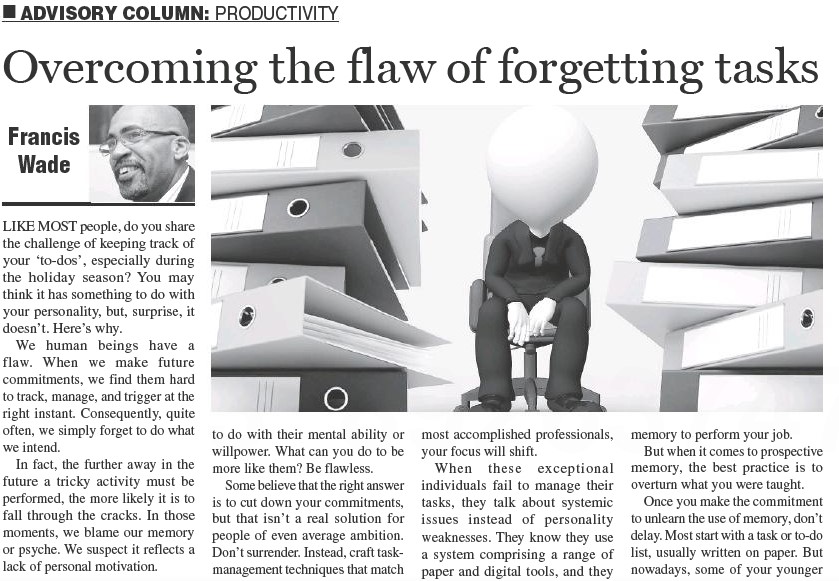Like most people, do you share the challenge of keeping track of your to-dos, especially during the holiday season? You may think it has something to do with your personality, but…surprise: it doesn’t. Here’s why.
We human beings have a flaw. When we make future commitments, we find them hard to track, manage, and trigger at the right instant. Consequently, quite often, we simply forget to do what we intend.
In fact, the further away in the future a tricky activity must be performed, the more likely it is to fall through the cracks. In those moments, we blame our memory, or psychology. We suspect it reflects a lack of personal motivation.
But the most effective professionals have found a way to recall tasks later, every time. But their performance has nothing to do with their mental ability or willpower. What can you do to be more like them?: flawless.
1. Forget About Using Memory
Some believe that the right answer is to cut down your commitments, but that isn’t a real solution for people of even average ambition. Don’t surrender. Instead, craft task management techniques which match your aspirations.
Unfortunately, this is easier said than done. First, you’ll have to undo mistakes you are making and untruths you were taught.
One mistake is to continue using your memory to track tasks. Why? Unless you have relaxed into a simple retirement, you are already committing to more tasks than you can recall. This is the direct outcome of being an engaged employee.
Unfortunately, your brain is no longer 11 years old. It cannot track tasks the way it once did, without help. Inside of a complex life, it doesn’t keep up.
Instead, give your memory the sack. Take away the job of tracking tasks and hire an external tool. You’ll stop complaining about the onset of early dementia, and, like the most accomplished professionals, your focus will shift.
When these exceptional individuals fail to manage their tasks, they talk about systemic issues instead of personality weaknesses. They know they use a system comprised of a range of paper and digital tools, and they are willing to upgrade it as needed to stay on top of a growing task volume.
As such, when there’s a failure, they change their system, rather than feeling guilty, or stupid.
Thus, they reverse a pernicious untruth. In school, we were shown that smart kids who did well on tests could remember everything; hence, their high marks. The irony is that, as an adult, the wise move is to do the opposite and stop using what’s called “prospective memory” for to-dos.
It’s fine to use “retrospective memory” to recall facts and figures. If you’re in the horse racing industry, don’t forget the number of yards in a furlong. You need this kind of memory to perform your job.
But when it comes to prospective memory, the best practice is to overturn what you were taught.
2. The Replacements
Once you make the commitment to unlearn the use of memory, don’t delay. Most start with a task or to-do list, usually written on paper. But nowadays, some of your younger colleagues are skipping over paper, going straight to a simple task app on their smartphones. So can you.
That should work for a while until you take on more tasks. Then, you should upgrade to a more powerful task management app. After that, with more growth, you will need to switch to using a calendar or even an auto-scheduler.
But these aren’t just matters of taste.
You should follow the described sequence in order to augment your capacity. To illustrate, think of a spoon as a device to transfer some soil. But if you want to move more earth, you should probably switch to a hand-trowel, shovel, wheelbarrow or tractor. Notice that each tool has greater capacity. But the “right” solution is the one that fits the job at hand.
The same applies to your choice of paper task list, simple task app, complex task app, digital calendar, auto-scheduler or trained administrative assistant. Once again, pick the right one from the lineup for your current circumstances. Then, keep an eye on early warning signs, which indicate it’s time to switch.
These aren’t common lessons taught in school. However, as quality task management becomes a hallmark of high professionalism, they are becoming widely accepted.
It’s ironic – the best memory for all your adult to-dos isn’t actually memory at all – not if you want perfection. Use a system that matches the depth of your commitments. In these tumultuous times, this is a terrific aspiration to create for 2022.
P.S. Registration is now open for the Task Management & Time Blocking Virtual Summit coming up on March 3-5, 2022.

